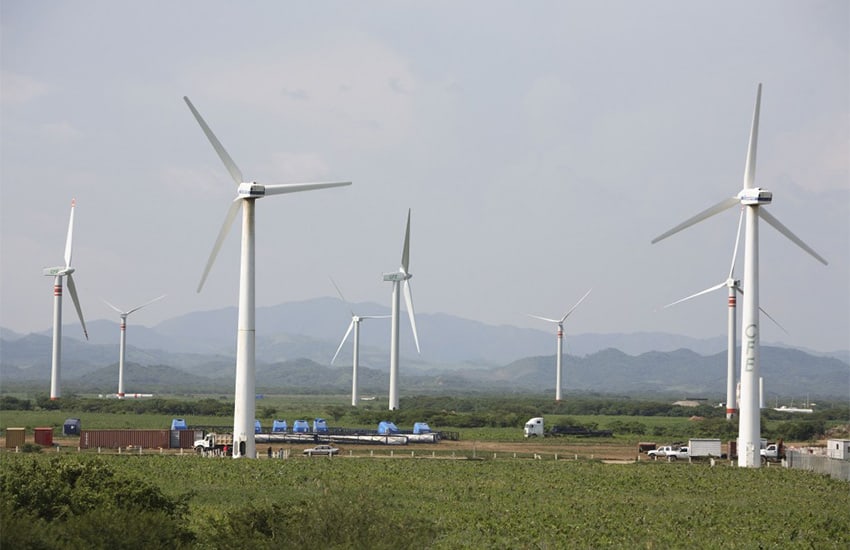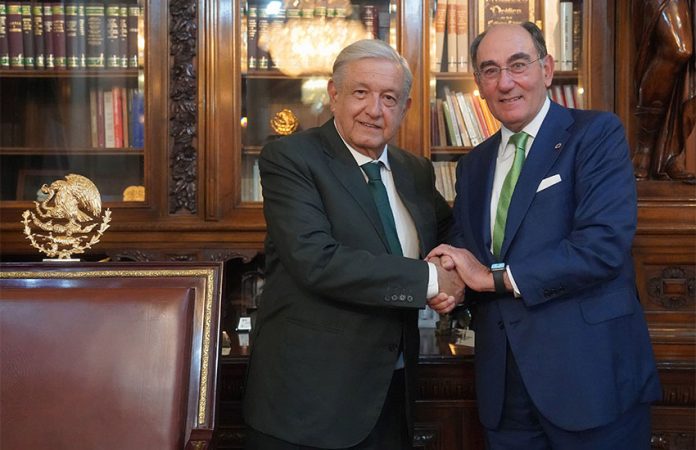The federal government has reached an agreement with Spanish energy company Iberdrola to purchase 13 of its power plants in Mexico for approximately US $6 billion.

President López Obrador on Tuesday hailed the deal as a “new nationalization of the electricity industry,” noting that it will allow the state-owned Federal Electricity Commission (CFE), which will operate the plants, to increase its share of the electricity market from just under 40% to 55.5%.
The agreement involves the purchase of 12 combined-cycle plants in six states — Baja California, Durango, Nuevo León, San Luis Potosí, Sinaloa and Tamaulipas — and a wind farm in Oaxaca.
Their combined electricity generation capacity is 8,539 megawatts (MW), with almost 99% of that amount coming from the 12 combined-cycle plants. The 13 plants represent almost four-fifths of Iberdrola’s installed capacity in Mexico. The Bilbao-based firm, a major player in the global renewables sector, is the largest private participant in Mexico’s electricity industry.
López Obrador, who says he is determined to rescue the CFE from what he describes as years of neglect, announced the purchase agreement in a video message posted to his social media accounts on Tuesday afternoon.

“We’re completing a very important deal to benefit the people of Mexico,” he said from the National Palace during a meeting with Iberdrola representatives, including CEO José Ignacio Sánchez Galán, best known as Ignacio Galán.
López Obrador – who has repeatedly held Iberdrola up as an example of what he calls unscrupulous foreign firms that have “looted” Mexico — acknowledged that his government and the company have had their “differences” but asserted that dialogue can resolve “everything.”
Finance Minister Rogelio Ramírez, who was also at the meeting, described the deal as “historic” and explained that the majority of the money for the transaction will come from the government’s National Infrastructure Fund (Fonadin).
Public debt won’t increase because Fonadin “is outside the public balance and is a vehicle capable of accessing the market to refinance this transaction,” he said.
“At the Finance Ministry we’re going to supervise this entire process. In the next five months the transaction will be completed,” Ramírez said, adding that additional details will be announced soon.
He noted that CFE’s share of the electricity market in Mexico’s northeast will increase from 7% to 45% as a result of the deal and asserted that the state-owned company’s electricity generation costs will decline.

The Finance Ministry (SHCP) said in a statement that the “average remaining lifespan” of the Iberdrola plants the government is purchasing is 18 years, but noted that the period could be increased to 28 years. It said that the government was paying Iberdrola the market price of US $696,000 per MW.
The agreement with the Spanish firm “strengthens the participation of the nation in the generation of electricity in order to comply with the responsibility of guaranteeing the supply of energy and price stability for Mexicans,” the SHCP said.
“… The government of Mexico is grateful for the flexibility and good will of … Iberdrola and recognizes the importance of dialogue to reach agreements that benefit the country and people.”
Iberdrola, which has had a presence in Mexico for over two decades but faced a range of obstacles in recent years including disconnections, nonrenewal of permits and fines, said in a statement that the agreed value for the sale is approximately $6 billion but noted that the price “may be modified based on the closing date of the transaction and other adjustments.”
The company said it had signed a memorandum of understanding related to the sale with Mexico Infrastructure Partners FF, a private company that is managing the government’s purchase.
Galán, who threatened in 2020 to stop investing in Mexico due to a lack of clarity about energy sector policies for foreign companies, said Tuesday that “Iberdrola is grateful for the support and flexibility shown by the Mexican government in reaching this agreement, and considers Mexico a strategic country with potential for growth and expansion, where it will show its support … by developing renewable capacity.”

He also said he believed Iberdrola was entering a “new phase” of relations with the Mexican government.
The company noted that it “continues to be the main private generator of renewable energy in Mexico” and expressed its “commitment to Mexico with the aim of leading the country’s energy transition.”
It published a document entitled “The New Iberdrola Mexico,” which says that the deal reached with the Mexican government “fits within” the company’s 2023-25 strategy. Mexico remains a “core market” but one where the company will have “a greener mix and a focus on private customers,” Iberdrola said, noting that it expects revenue of US $400 million in 2023 from its Mexico operations.
Most of the 13 plants the company is selling are required to supply electricity to the CFE.
In remarks made during López Obrador’s video message, Galán said that Iberdola’s “desire” was to continue collaborating with Mexico “in the way the government of Mexico wants.”
He stressed that the company is committed to complying with Mexico’s energy policies, which are currently the subject of a challenge under the USMCA free trade pact because the United States and Canada believe they unfairly favor the CFE and state oil company Pemex over private companies.

Speaking again after Galán’s comments, López Obrador said that the CFE could have a 65% share of the electricity market by the end of his six-year term in 2024 as the company is building new generation facilities and rehabilitating hydropower plants.
Achieving such a share would represent “the definitive rescue” of the CFE, “guarantee the permanent supply of electricity” as demand grows and ensure that power prices don’t rise, he said.
“… Without exaggerating, this deal means … the rescue of the Federal Electricity Commission and a new nationalization of the electricity industry,” López Obrador said.
“… We believe that it’s very important that our country maintain public companies, like the Federal Electricity Commission and Petróleos Mexicanos [Pemex]. We shouldn’t opt for privatization in social and strategic activities,” he said.
With reports from El Economista and El País
